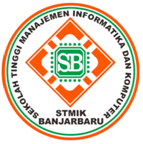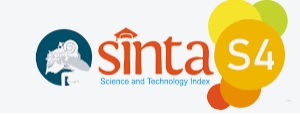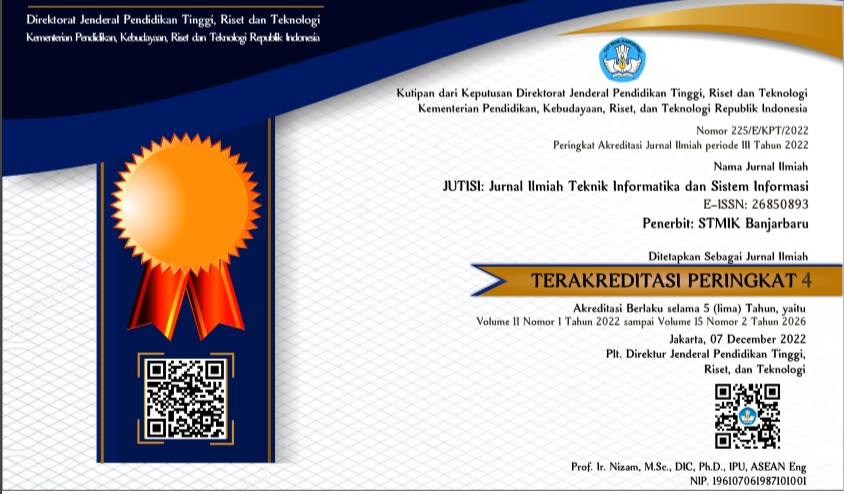Digital Context Influences Batam Students’ Educational Ethics
Abstract
The rapid development of digital technology can cause serious problems, namely, the use of digital technology with an unethical attitude. The objective of this study is to analyze the use of digital technology can affect the unethical attitude of students in Batam city. By collecting 360 total data samples, all collected data will be analyzed using SPSS software by using extraction method: principal component analysis, factor analysis was conducted, and it was found that there are 3 factors: the development of the digital context has eliminated professional ethical attitudes, inappropriate use of digital technology, and the educational community's response to unethical attitudes. We conclude that the influence of the digital context with the development of digital technology can affect the unethical attitudes of Batam city students so that it requires provisions and policies from educational institutions to direct training to avoid the negative influence of the use of digital technology.
Keywords: Digital Context; Digital Technology; Ethic; Principal Component Analysis
Abstrak
Perkembangan teknologi digital yang semakin pesat dapat menimbulkan masalah yang serius, yaitu penggunaan teknologi digital dengan sikap yang tidak beretika. Tujuan dari penelitian ini adalah untuk menganalisis penggunaan teknologi digital dapat mempengaruhi sikap tidak etis mahasiswa di kota Batam. Dengan mengumpulkan 360 total sampel data, semua data yang terkumpul akan dianalisis menggunakan perangkat lunak SPSS dengan menggunakan extraction method: principal component analysis: analisis faktor dilakukan, dan ditemukan bahwa ada 3 faktor: perkembangan konteks digital telah menghilangkan sikap etika profesional, penggunaan teknologi digital yang tidak tepat, dan respon komunitas pendidikan terhadap sikap tidak etis. Kami menyimpulkan bahwa pengaruh konteks digital dengan perkembangan teknologi digital dapat mempengaruhi sikap tidak etis mahasiswa kota Batam sehingga diperlukan ketentuan dan kebijakan dari institusi pendidikan untuk mengarahkan pelatihan agar terhindar dari pengaruh negatif penggunaan teknologi digital.
Keywords
References
P. K. Sahu, “Closure of Universities Due to Coronavirus Disease 2019 (COVID-19): Impact on Education and Mental Health of Students and Academic Staff,” Cureus, vol. 12, no. 6, pp. 17–22, 2020, [Online]. Available: https://api.semanticscholar.org/ CorpusID:216420018
M. Muliadi And M. Mislaini, “Analisis Respon Siswa Pada Pembelajaran Daring Di Masa Pandemi Covid 19,” J. Kegur. dan Ilmu Pendidik., vol. 1, pp. 228–232, 2023, doi: 10.61116/jkip.v1i3.179.
S. Gundogan, “The Relationship of COVID-19 Student Stress with School Burnout, Depression and Subjective Well-Being: Adaptation of the COVID-19 Student Stress Scale into Turkish,” Asia-Pacific Educ. Res., vol. 32, no. 2, pp. 165–176, 2023, doi: 10.1007/s40299-021-00641-2.
R. Haryadi and F. Selviani, “Problematika Pembelajaran Daring Di Masa Pandemi Covid-19,” Acad. Educ. J., vol. 12, no. 2, pp. 254–261, 2021, doi: 10.47200/aoej.v12i2.447.
Z. M. Rodzi et al., “Unraveling the Complexity: A DEMATEL Analysis of the Negative Impact of Artificial Intelligence (AI) Adoption among Students in Higher Education,” J. Intell. Syst. Internet Things, vol. 11, no. 2, pp. 30–41, 2024, doi: 10.54216/JISIoT.110203.
R. Si and J. Zhang, “Covid-19, Work from Home and College Major Choice,” SSRN Electron. J., 2023, [Online]. Available: https://api.semanticscholar.org/CorpusID: 257570354
I. Rachmawati Maruf, B. Sulistiyo Nugroho, A. Kurniawan, Z. Musiafa, and E. Satria, “Virtual Learning Apps: Best Instructional Leadership Practices in the Digital Age Efforts to Improve Student Learning Outcomes,” J. Iqra’ Kaji. Ilmu Pendidik., vol. 7, no. 1, pp. 32–43, 2022, doi: 10.25217/ji.v7i1.2187.
C. O. Sari, D. E. Citra, S. Saepudin, and A. I. N. Adhitya, “Penanaman Sikap Sosial melalui Pembelajaran IPS pada Siswa Kelas VIII SMP,” KagangaJurnal Pendidik. Sej. dan Ris. Sos. Hum., vol. 6, no. 2, pp. 576–584, 2023, doi: 10.31539/kaganga.v6i2.7120.
M. A. Fitri, “The Role of Character Education in Shaping Student Work Ethic: Teacher and Parent Perspectives,” J. Ar Ro’is Mandalika, vol. 4, no. 1, pp. 18–25, 2024, doi: 10.59613/armada.v1i2.2815.
J. A. S. Campos, C. I. O. Gómez, and M. D. C. Pais, “Study of academic plagiarism through multidimensional scaling and network analysis,” Rev. Educ., vol. 15, no. 397, pp. 279–306, 2022, doi: 10.4438/1988-592X-RE-2022-397-548.
V. Cebrián Robles, M. Raposo, and F. J. Rey, “Conocimiento de los estudiantes universitarios sobre herramientas antiplagio y medidas preventivas,” Pixel-Bit, Rev. Medios y Educ., vol. 57, pp. 129–149, 2020, doi: 10.12795/pixelbit.2020.i57.05.
A. Liaqat and F. Liaqat, “Covid-19 Impact on the Internet, User Experience and Economy in Pakistan,” 2021 6th Int. Multi-Topic ICT Conf., vol. 2, no. 3, pp. 1–5, 2021, [Online]. Available: https://api.semanticscholar.org/CorpusID:247231212
X.-Y. Wu, “Exploring the effects of digital technology on deep learning: a meta-analysis,” Educ. Inf. Technol., vol. 29, pp. 425–458, 2023, [Online]. Available: https://api.semanticscholar.org/CorpusID:265193179
D. C. Nguyen et al., “6G Internet of Things: A Comprehensive Survey,” IEEE Internet Things J., vol. 9, no. 1, pp. 359–383, 2022, doi: 10.1109/JIOT.2021.3103320.
G. Reginald, “Teaching and learning using virtual labs: Investigating the effects on students’ self-regulation,” Cogent Educ., vol. 10, no. 4, pp. 18–32, 2023, [Online]. Available: https://api.semanticscholar.org/CorpusID:257068547
S. Sinha, S. Sinha, B. Kaur, and Sheenam, “Impact of Artificial Intelligence on Work,” 2023 7th Int. Conf. Electron. Mater. Eng. Nano-Technology, vol. 7, no. 5, pp. 1–6, 2023, doi: 10.1109/IEMENTech60402.2023.10423502.
S. Eken, “Ethic wars: student and educator attitudes in the context of ChatGPT,” SSRN Electron. J., vol. 6, no. 7, pp. 9–17, 2023, doi: 10.2139/ssrn.4365433.
Y. Llovera-López, Y. Aragón-Carretero, and P. Cano-Olivares, “Academic Ciberplagiarism among university students: an approach to the current state of the subject (2017-2020),” Rev. Colomb. Educ., vol. 13, no. 87, pp. 207–226, 2023, doi: 10.17227/rce.num87-13143.
V. Cebrián-Robles, M. Raposo-Rivas, F. J. Ruiz Rey, and M. C. De La Serna, “Propuestas de los estudiantes para evitar el plagio académico,” IJERI Int. J. Educ. Res. Innov., no. 16, pp. 223–235, 2021, doi: 10.46661/ijeri.6154.
A. Sheveleva, “The university teachers’ professional ethics from the students’ perspective,” E3S Web Conf., vol. 4, no. 3, pp. 10–21, 2020, [Online]. Available: https://api.semanticscholar.org/CorpusID:234967906
D. R. E. Cotton, P. A. Cotton, and J. R. Shipway, “Chatting and cheating: Ensuring academic integrity in the era of ChatGPT,” Innov. Educ. Teach. Int., vol. 61, no. 2, pp. 228–239, 2024, doi: 10.1080/14703297.2023.2190148.
V. Cebrián-Robles, F. J. Ruíz-Rey, M. Raposo-Rivas, and M. Cebrián-de-la-Serna, “Impact of Digital Contexts in the Training of University Education Students,” Educ. Sci., vol. 13, no. 9, pp. 2–8, 2023, doi: 10.3390/educsci13090923.
N. Lestari and T. I. Sucipto, “The Impact of Intellectual Intelligence, Emotional Intelligence, Spiritual Intelligence and Demographic Factors on Student Ethic,” vol. 5, no. Icaess 2020, pp. 317–327, 2021, doi: 10.5220/0010355903170327.
C. K. Y. Chan, “A comprehensive AI policy education framework for university teaching and learning,” Int. J. Educ. Technol. High. Educ., vol. 20, no. 1, pp. 5–7, 2023, doi: 10.1186/s41239-023-00408-3.
G. S. Alkhadim, “Cronbach’s Alpha and Semantic Overlap Between Items: A Proposed Correction and Tests of Significance,” Front. Psychol., vol. 13, no. February, pp. 1–6, 2022, doi: 10.3389/fpsyg.2022.815490.
L. SÜRÜCÜ and A. MASLAKÇI, “Validity and Reliability in Quantitative Research,” Bus. Manag. Stud. An Int. J., vol. 8, no. 3, pp. 2694–2726, 2020, doi: 10.15295/bmij.v8i3.1540.
P. L. Suresh and K. N. Raju, “Study of Test for Significance of Pearson’s Correlation Coefficient,” Int. J. Sci. Res., vol. 4, no. 6, pp. 4–8, 2022, [Online]. Available: https://api.semanticscholar.org/CorpusID:260322111
Z. Yu, M. Guindani, S. F. Grieco, L. Chen, T. C. Holmes, and X. Xu, “Beyond t test and ANOVA: applications of mixed-effects models for more rigorous statistical analysis in neuroscience research,” Neuron, vol. 110, pp. 21–35, 2021, [Online]. Available: https://api.semanticscholar.org/CorpusID:244074408
I. E. Rannala, J. Gorman, H. Tierney, Guðmundsson, J. Hickey, and T. Corney, “Ethical Practice in Professional Youth Work: Perspectives from Four Countries,” Ethics Soc. Welf., vol. 18, no. 2, pp. 195–210, 2024, doi: 10.1080/17496535.2024.2312274.
C. Wang, X. Chen, T. Yu, Y. Liu, and Y. Jing, “Education reform and change driven by digital technology: a bibliometric study from a global perspective,” Humanit. Soc. Sci. Commun., vol. 11, no. 1, pp. 2–6, 2024, doi: 10.1057/s41599-024-02717-y.
M. Tanveer, S. Hassan, and A. Bhaumik, “Academic policy regarding sustainability and artificial intelligence (Ai),” Sustain., vol. 12, no. 22, pp. 1–13, 2020, doi: 10.3390/su12229435.
M. Peng and Z. Zhang, “Research on the Hot Spots and Theme Evolution of Artificial Intelligence Education Policy in China,” 2024 Int. Conf. Informatics Educ. Comput. Technol. Appl., vol. 9, no. 15, pp. 160–164, 2024, doi: 10.1109/IECA62822.2024.00037.
D. Schiff, “Education for AI, not AI for Education: The Role of Education and Ethics in National AI Policy Strategies,” Int. J. Artif. Intell. Educ., vol. 8, no. 4, pp. 5–13, 2021, doi: 10.1007/s40593-021-00270-2.
H. Ernanto and S. Hermawan, “Enhancing Digital Technology Education for School Children,” Indones. J. Law Econ. Rev., vol. 14, no. 3, pp. 6–14, 2022.
D. Setiana and N. Besar, “Destructive Digital Ecosystem of Cyber Bullying Perfective Within the Information Technology Age,” OUCI, vol. 6, no. 21, pp. 26–32, 2021, [Online]. Available: https://api.semanticscholar.org/CorpusID:234052998
How To Cite This :
Refbacks
- There are currently no refbacks.











